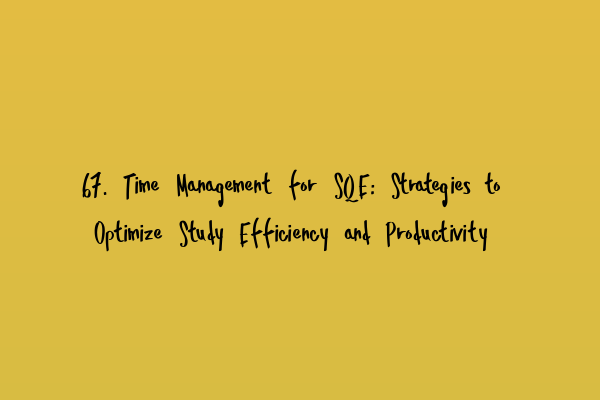67. Time Management for SQE: Strategies to Optimize Study Efficiency and Productivity
Are you planning to take the Solicitors Qualifying Exam (SQE)? As a future solicitor, it’s essential to utilize effective time management strategies to optimize your study efficiency and productivity. The SQE exams are rigorous and demanding, requiring a comprehensive understanding of various legal subjects. To ensure success, it’s crucial to make the most of your study time. In this article, we will explore some valuable time management strategies specifically tailored to help SQE exam candidates excel.
The Importance of Time Management for SQE Candidates
Time management is the key to SUCCESS for any SQE candidate. With numerous subjects to cover and countless practice questions to solve, effective time management will help you stay on track and overcome any potential overwhelm. Properly allocating your study time allows you to dedicate sufficient attention to each topic and ensures that you cover all the necessary material before the exams.
1. Create a Study Schedule
Start by creating a detailed study schedule for each day, week, and month leading up to the SQE exams. A study schedule acts as a roadmap, keeping you organized and focused on your goals. Break down your study sessions into manageable time blocks and allocate specific topics to each session. Prioritize the subjects that you find most challenging or require more practice. Be realistic with your time allocation and allow for breaks to avoid burnout.
To create an effective study schedule, consider using online planning tools or mobile apps that can help you track your progress, set reminders, and customize your study plan according to your preferences. It’s important to have a visual representation of your study schedule so that you can easily see your upcoming sessions and monitor your progress.
2. Set Realistic Goals
Setting clear and realistic goals is crucial for effective time management. Identify your short-term and long-term study goals and break them into smaller, achievable tasks. For example, if you have one month to study a particular subject, set weekly targets to cover specific chapters or topics. By breaking your goals into smaller tasks, you create a sense of accomplishment as you complete each one, which in turn boosts motivation and improves productivity.
3. Identify Your Peak Study Times
Understanding your peak study times is essential for optimizing efficiency. Some individuals are more focused and alert in the morning, while others perform better in the evening. Pay attention to your energy levels and concentration throughout the day, and identify when you are most productive. Schedule your most challenging or important study sessions during your peak study times to make the most of your brainpower.
4. Eliminate Distractions
Distractions can significantly impact your study efficiency. Create a distraction-free study environment by minimizing interruptions. Turn off or silence your phone, log out of social media accounts, and find a quiet space where you can concentrate without interruption. Consider using website blockers or apps that limit access to distracting websites during your study sessions. Use noise-cancelling headphones if necessary to minimize external noise.
5. Practice Time Management Techniques
Adopting specific time management techniques can help enhance your productivity. Some popular techniques include the Pomodoro Technique, where you work in focused 25-minute intervals with short breaks in between, and the time blocking method, where you allocate specific time blocks for different tasks or subjects. Explore various techniques and find the one that suits your working style and helps you stay focused and productive.
6. Utilize SQE Exam Preparation Resources
Make the most of SQE exam preparation resources to optimize your study time. Online platforms, such as FQPS, offer comprehensive SQE 1 and SQE 2 preparation courses that provide structured study materials, practice questions, and interactive quizzes to help you test your knowledge and identify areas where you need improvement. Take advantage of these resources to streamline your study process and ensure you cover all the necessary topics.
7. Take Breaks and Rest
While it may seem counterintuitive, taking regular breaks and getting adequate rest is crucial for effective time management. Breaks allow your brain to recharge and assimilate information, preventing burnout and mental fatigue. Incorporate short breaks into your study sessions, ensuring that you get up, stretch, and engage in activities that help you relax and recharge. Additionally, prioritize a good night’s sleep to optimize your cognitive function and retain information better.
Stay Committed and Consistent
Effective time management requires commitment and consistency. Stick to your study schedule, stay focused during your allotted study times, and continuously evaluate your progress. Regularly assess your strengths and weaknesses to adjust your study plan accordingly. Remember, the SQE exams are a marathon, not a sprint, and staying disciplined and consistent in your study routine is key to achieving success.
Implementing these time management strategies will help you optimize your study efficiency and productivity as an SQE exam candidate. Remember to create a study schedule, set realistic goals, identify your peak study times, eliminate distractions, practice time management techniques, utilize SQE exam preparation resources, take breaks and rest, and stay committed and consistent. By prioritizing effective time management, you will be well on your way to achieving success in the SQE exams.
Related Articles:
